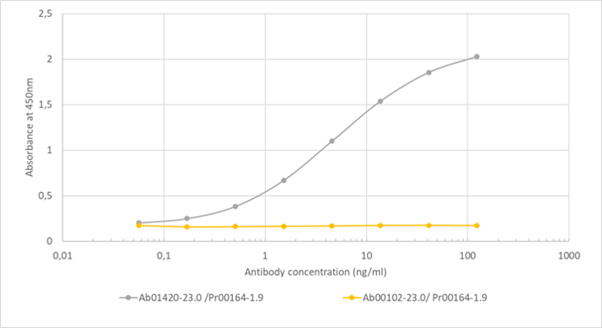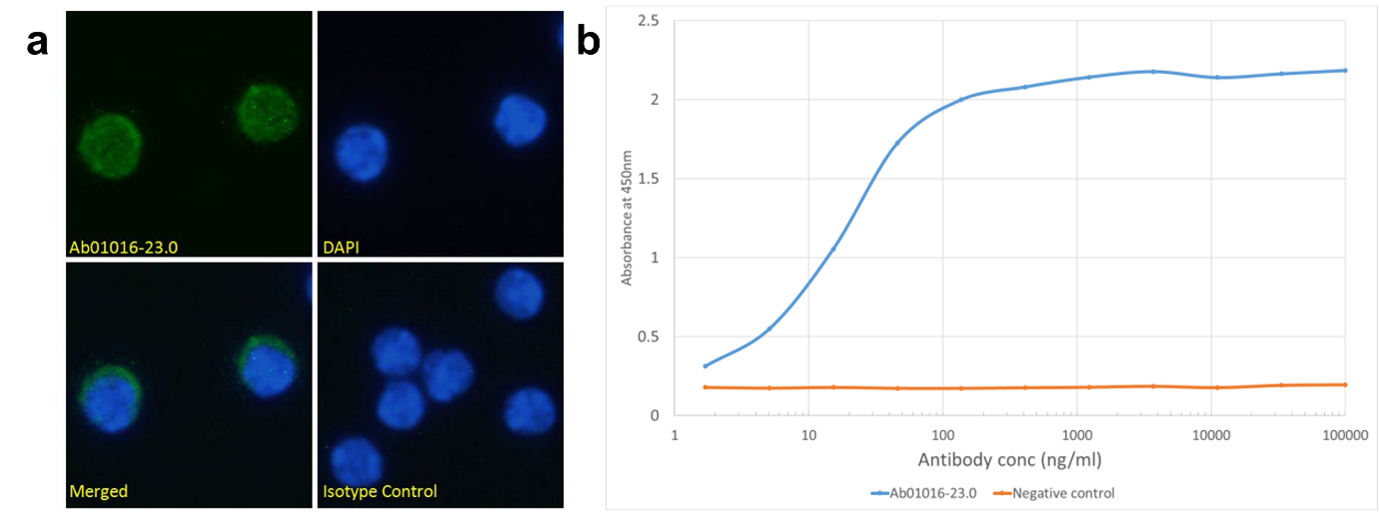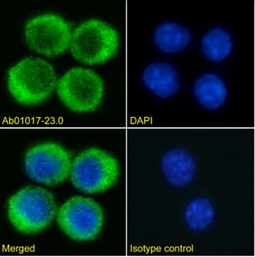Cancer cells utilize immune checkpoints to evade immune recognition and promote uncontrolled proliferation and metastasis (Vinay et al., 2015). The field of cancer immunotherapy has revolutionized cancer treatment, and the use of anti-VISTA antibodies has emerged as a promising strategy to counteract immune evasion and enhance the immune response against cancer (Lines et al., 2014). Monoclonal antibodies are a valuable resource for cancer immunotherapy, and we at Absolute Antibody offer four recombinant anti-VISTA clones (Table 1).
VISTA, also known as PD-1 homolog (PD-1H), is a negative checkpoint regulator that plays a role in immune surveillance and autoimmunity (Wang et al., 2011). It belongs to the B7 family of ligands and receptors within the immunoglobulin superfamily. VISTA is predominantly expressed on hematopoietic cells, with a highly regulated expression on myeloid antigen-presenting cells. Through interactions with immune cell receptors, VISTA suppresses the activation of immune cells, maintaining immune tolerance and preventing excessive inflammation.
Dysregulation or overexpression of VISTA has been implicated in various diseases, including cancer, where it contributes to an immunosuppressive microenvironment and tumor evasion (Nowak et al., 2017). For instance, VISTA is crucial in regulating immune responses in the tumor microenvironment (TME). It is expressed on various cells within the TME, including myeloid cells, lymphoid cells, and tumor cells, allowing it to exert significant control over innate and adaptive anti-tumoral immune responses. VISTA expression within the TME has been associated with immune resistance, tumor growth, and poor prognosis in certain cancers. Furthermore, studies have shown that VISTA overexpression is associated with tumor relapse, immune resistance development, and inferior disease-specific survival in melanoma. (Hosseinkhani et al., 2021).

Figure 1. ELISA using anti-VISTA antibody 13F3 (Ab01420, gray line) binding to recombinant mouse VISTA Fc fusion protein.
Anti-VISTA antibodies act by altering the interaction between VISTA and its receptors, negating its inhibitory effects, and unleashing the immune system’s full potential, enabling a robust and effective anti-tumor response. These antibodies have the potential to overcome immune suppression, enhancing patient outcomes and overall survival rates (Yum & Hong, 2021). Moreover, the combined blockade of VISTA with other inhibitory immune checkpoints, such as PD-L1, has shown synergistic effects in preclinical studies, especially in patients who have acquired resistance to PD-1/CTLA-4-targeting antibodies, indicating the potential of VISTA as a target for cancer therapy (Hosseinkhani et al., 2021). Anti-VISTA antibodies have already proven effective in clinical settings, and there are currently several ongoing clinical trials involving anti-VISTA antibody therapy (Martin et al., 2023). For example, CI-8993 has been used to target the VISTA ligand in patients with relapsed or refractory solid tumors (Zong et al., 2022).
While further research is needed to fully understand the mechanisms of anti-VISTA antibodies and their interaction with other related immune checkpoints, their proven therapeutic applications make them valuable tools for pursuing novel treatments and immunotherapies.
Absolute Antibody’s Anti-VISTA Range of Products
We at Absolute Antibody specialize in the production and engineering of recombinant antibodies. Our product range includes high-quality anti-VISTA antibodies with exceptional specificity, affinity, and engineering advancements.
Anti-VISTA antibodies that we currently offer include:
- 13F3 (Ab01420): this antagonistic anti-VISTA antibody blocks the interaction between VISTA and its receptors, leading to enhanced anti-tumor immune response and suppressed tumor growth in mouse models of melanoma (Le Mercier et al., 2014, Wang et al., 2020). In-house testing of our recombinant rabbit IgG version of this antibody (Ab01420-23.0) demonstrated successful binding to a recombinant mouse VISTA Fc fusion protein (Pr00164-1.9) in an enzyme-linked immunosorbent assay (ELISA) (Figure 1).
- 11A4 (Ab03306): this anti-VISTA antibody shows potential in laboratory techniques such as Western blotting, immunohistochemistry, and ELISA (patent CN112940125A).
- mam82 (Ab01017): this agonistic anti-PD-1H antibody promotes the induction of TGF-β-induced regulatory T cells (iTregs) in vitro and results in moderate expansion of iTreg cells derived from naive T cells (Wang et al., 2017, Wang et al., 2020). In-house testing of our recombinant rabbit IgG version of this antibody (Ab01017-23.0) demonstrated successful staining of RAW 264.7 cells in an immunofluorescence assay (Figure 2).
- MH5A (Ab01016): this strong agonistic anti-PD-1H antibody promotes TGF-β iTreg cells in vitro and suppresses the progression of GVHD in mouse models, accompanied by iTreg expansion (Wang et al., 2017, Wang et al., 2020). In-house testing of our recombinant rabbit IgG version of this antibody (Ab01016-23.0) demonstrated successful staining of mouse splenocytes in an immunofluorescence assay (Figure 3a) and successful binding to a recombinant mouse VISTA Fc fusion protein (Pr00164-1.9) in an ELISA (Figure 3b).
Of our anti-VISTA antibodies, 13F3 (Ab01420-3.3) and mam82 (Ab01017-1.1) have been further engineered to be part of our VivopureX™ collection, specifically designed for in vivo research in mice. Additionally, we offer Fc Silent™ formats for all these antibodies, which eliminates antibody-directed cytotoxicity effector function of Fc receptors through key point mutations.

Figure 3. (a) Immunofluorescence staining of mouse splenocytes and (b) ELISA binding data to VISTA-Fc fusion protein using MH5A (Ab01016).
Your Crucial Part in Advancing Cancer Treatment with Anti-VISTA Antibodies
As a contributor to the field of medicine, your work has the potential to make a difference in countless lives. In light of recent advances made in the development of anti-VISTA antibodies, an exciting opportunity awaits you to elevate your research and therapeutic solutions to unprecedented heights. With Absolute Antibody’s comprehensive range of exceptional antibodies, including those tailored specifically for targeting VISTA, you can gain access to unparalleled support for groundbreaking research and the delivery of highly effective cancer therapies. Whether you require cutting-edge recombinant antibodies, innovative recombinant proteins, or personalized antibody services, Absolute Antibody is ready to provide the essential resources you need to propel your research forward confidently.
Are you interested in our available anti-VISTA antibodies or other formats? We can offer our antibodies in custom formats upon demand. Please contact us for more information.
Table 1. Anti-VISTA Antibodies Available in Absolute Antibody’s Product Catalog.
| Antibody ID | Clone | Antigen | Published Applications | Published Species Reactivity | Available Formats |
|---|---|---|---|---|---|
| Ab01016 | MH5A | PD-1H | Therapeutic, Blocking, ELISA, IHC | Mouse | Hamster (Armenian) IgG Mouse IgG1 Mouse IgG2a Mouse IgG2a, Fc Silent™ Rabbit IgG |
| Ab01017 | Mam82 | PD-1H | Blocking, ELISA, IHC | Mouse | Rabbit IgG Mouse IgG1 Mouse IgG2a Mouse IgG2a, Fc Silent™ Mouse Bispecific, anti-mPD-L1 |
| Ab01420 | 13F3 | VISTA | Blocking, ELISA, FC | Mouse | Hamster (Armenian) IgG Mouse IgG2b Mouse IgG2b, Fc Silent™ Mouse IgG1-D265A, Fc Silenced Mouse Fab fragment, His-Tagged Mouse IgG2a Rabbit IgG |
| Ab03306 | 11A4 | VISTA | WB, ELISA, IHC | Human | Mouse IgG2a Mouse IgG2a, Fc Silent™ Human IgG1 Human IgG1, Fc Silent™ Rabbit IgG |
Latest News
Upcoming Events
Please join us at the following conferences and events. Stop by our booth, or get in touch to arrange a meeting.
See All Dates
 United Kingdom (UK)
United Kingdom (UK) 